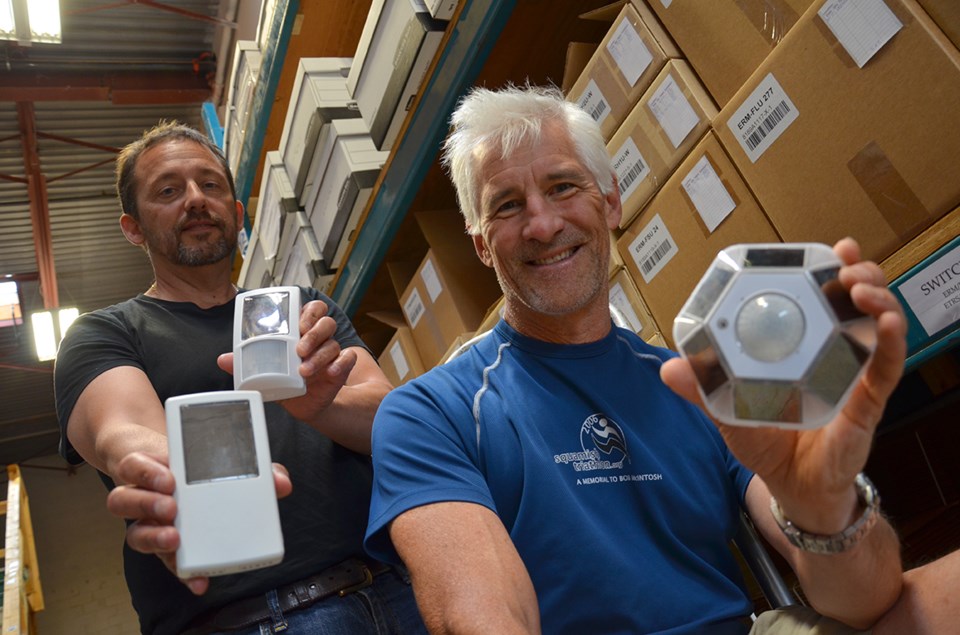The owners of a luxury dog hotel in California had an annoying problem – a chorus of barking would erupt whenever they had to turn on the lights at night.
They wanted the dogs to stay fast asleep in their deluxe kennels, but staff also needed enough lights to refill food bowls and rearrange the dogs’ pillows.
In stepped Squamish-based Echoflex Solutions, a tech company that is changing the world of self-powered energy controls.
They retrofitted Wag Hotel’s lighting system, which at the time didn’t meet the California Energy Commission’s building energy efficiency standards, and solved the problem of the canines waking at night.
Echoflex, located in the Squamish Business Park, designed a system that dimmed the interior lights down and up based on sunset and sunrise. To not startle the dogs, the lighting level gradually changes over a half-hour period.
The lights themselves dim down to only five per cent, allowing the staff to enter the state-of-the-art kennels unnoticed by the snoozing guests.
And, since this is a luxury hotel, owners have the ability to adjust the light level via a website so they can see their four-legged friends at any time.
As a tech company, Echoflex is the kind of business the District of Squamish is trying to attract, particularly to the Squamish Business Park area.
It joins other tech companies such as OneUp Components, a “rec-tech” company specializing in mountain bike equipment; Carbon Engineering, which deals with industrial scale capture of CO2; and VentureWeb, a web design and digital marketing agency with a focus on adventure brands and experiences.
“Squamish had the allure we thought necessary to attract young, up-and-coming talent,” said Shawn Pedersen, who created the company with fellow long-time Squamish resident Brian Aikens over beers after hitting the local mountain bike trails.
Like other tech ventures, the duo chose Squamish because of its ample outdoor recreation opportunities and the potential of the town to transform into a high-tech hub.
Echoflex, which has now grown to have 15 employees from Squamish, the Lower Mainland and remotely in California, as well as 40 representatives worldwide, creates wireless, battery-free sensors that use solar power and kinetic energy to activate tiny radios that speak to each other.
The company combines the experience of Aikens, who headed Douglas Lighting Control’s engineering department for 12 years, with that of Pedersen, who previously owned a car dealership.
“More people are looking for energy-saving devices and wireless solutions are becoming mainstream,” said Pedersen. “People are learning that batteries don’t decompose in the landfill. They are nasty for the environment.”
His work includes installing equipment in office buildings in Japan, hotels in Dubai and Las Vegas and in the Seattle Municipal Tower, the fourth tallest building in the city. Closer to home, Echoflex’s lighting has been used in Britannia Mine Museum, at the West Coast Heritage Railway Museum and during the 2010 Winter Olympics.
“We’re constantly innovating products,” said Pedersen, who is looking toward agriculture as a new market, including uses for Echoflex’s lighting in land-based fish farms and hatcheries.
“We can simulate daylight in the fish building to promote fish growth. It’s about maintaining our food supply with fish, vegetables and produce for our own consumption.”
To gather information, he toured Tenderfoot Hatchery, an aquafarm on Vancouver Island, and fish-processing plants in the Netherlands.
He plans to build an aquaponics research facility in his 7,000-square-foot office building that would serve as a testbed.
Echoflex has also recently created the first self-powered sensors that can detect noise, such as typing or speaking, in addition to movement, so the lights stay on when someone is in the room.
“We compete with multi-billion dollar companies, but because we’re smaller we can develop on a much quicker scale,” said Pedersen.



